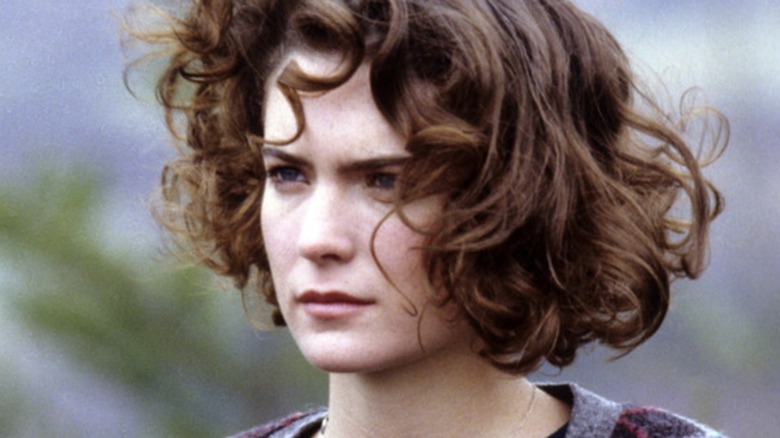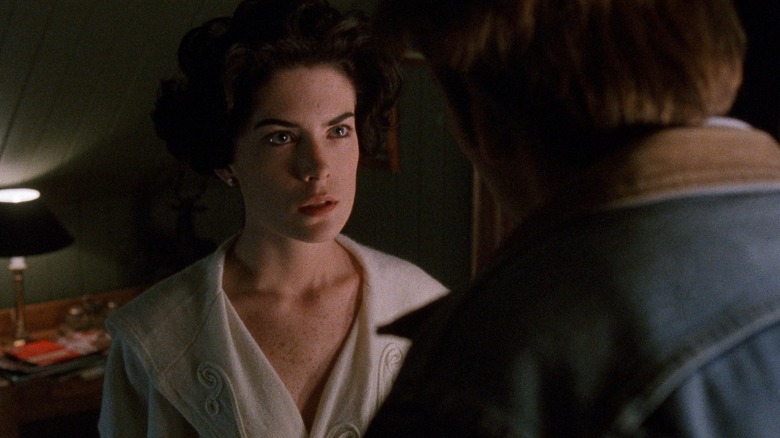Twin Peaks Star Lara Flynn Boyle Had Her Scenes Cut From A Classic '80s Movie
Donna Hayward. This "Twin Peaks" character might elicit mixed reactions, but Donna is an integral part of the titular town and every beautiful and terrifying sentiment it stands for. Donna — played by Lara Flynn Boyle in the first two seasons of "Twin Peaks" — is our closest connection to Laura Palmer (Sheryl Lee) after her death, her perspective being intimate, complex, and tinged with a sense of naivete. But there's more to Donna than her perfectly routine teenage existence, which she wants to desperately shed in anticipation of a more adventurous life. Boyle plays Donna with both sweet tenderness and fierce intensity, etching a character that adds to the mythos of "Twin Peaks" in understated ways.
Boyle's involvement in "Twin Peaks" paved the path for more roles down the path, including the lead in John Dahl's neo-noir film "Red Rock West" and "The Temp." Since then, Boyle appeared in a string of film projects (you might remember her as the antagonistic Serleena in "Men in Black II"), along with a notable television role in "The Practice," for which Boyle received an Emmy nomination. However, years before her "Twin Peaks" breakout role in 1990, Boyle had envisioned that a classic coming-of-age drama would catapult her to stardom instead. This film was Peter Weir's "Dead Poets Society," which has deservedly won accolades for its astounding profundity (including numerous Academy Award Nominations, including Best Picture and Best Actor for Robin Williams).
Unfortunately, Boyle's scenes from Weir's film ended up being cut. To add insult to injury, Boyle wasn't aware of this until she went to watch the film, leading to an understandable reaction of bitter disappointment. Let's take a look at what Boyle had to say about her experience connected to the acclaimed "Dead Poets Society."
Lara Flynn Boyle went on to bag memorable roles despite being cut from Peter Weir's film
In an interview with PEOPLE, Boyle explained how "crushed" she felt after finding out that she had been cut from the film, as she had no prior intimation that this was going to happen:
"I wasn't in the movie. I'm watching 'Dead Poets Society' with my mom, and I kept [going], 'Here comes my scene, here comes my scene.' No scene, no scene. They never told me [I was cut]."
Boyle was supposed to play Ginny Danburry in the film, a student at Henley Hall (a sister school of sorts to Welton Academy) who takes part in the "Midsummer Night's Dream" play after Chris (Alexandra Powers) urges her to do so. You might remember that this Shakespearean play is integral to Neil's (Robert Sean Leonard) arc in the film, as he discovers his passion for acting after embodying Puck in the story. This is yet another instance of children embracing art to express themselves authentically, despite being burdened by parental expectations that starkly contrast with the kind of people they want to become. Although details about Boyle's role remain scarce, we do see a glimpse of her character in the final cut (Ginny briefly appears onstage and backstage during the play's production).
Although Boyle was affected by this at the time, she was quickly cast in "Twin Peaks," along with films like "Threesome" and "Wayne's World," which helped pave the path for success. After playing several prominent roles, Boyle took a lengthy break from Hollywood, but eventually returned to take part in new projects. In 2021, Boyle talked about the sum of her experiences as an actor while promoting her film, "Death in Texas," noting that she's "proud" of the work she has done so far (via The Hollywood Reporter):
"I'm proud of so much. I got to work with some of the most brilliant directors ever [...] It's astonishing how fortunate I've been. It's just astonishing. I must've done something good in a past life. Or it's just Irish luck. Gosh, I've been so fortunate."
In case you want to check out Boyle in something more recent, 2023's "Mother, Couch" is a solid choice. This Niclas Larsson comedy drama features some terrific performances, swinging between absurdity and realism to drive its intriguing story home.

